srImathE rAmAnujAya nama:
srImadh varavaramunayE nama:
srI vAnAchala mahAmunayE nama:
essential principles of our glorious sampradhAyam. He was also given the
responsibility by emperumAnAr of taking care of emperumAnAr‘s personal
thiruvArAdhana deities.
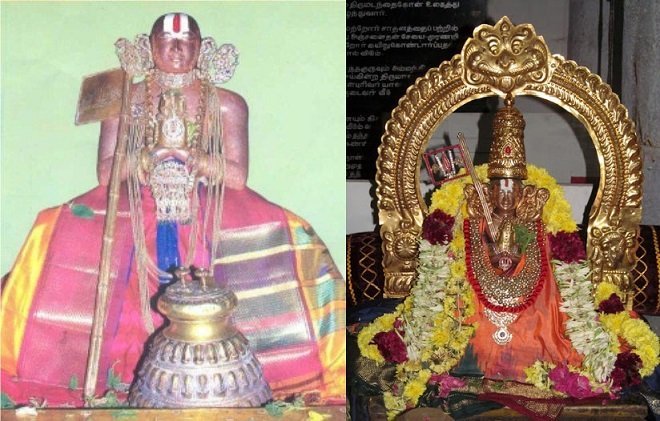
was originally named yagya mUrthy and was a great scholar in
mAyAvAdham. He was an EkadhaNda sannyAsi. He once visited srIrangam and
challenged srI rAmAnuja for a debate. It was agreed upon that the loser
of the debate will become the sishya of the winner. srI rAmAnuja also
declared that he will give up doing any literary work if he lost the
debate.
debate begins and goes on for 18 days without convincing victory for
either one. On the 17th day, yagya mUrthy was getting an upper hand
towards the end. In the night, emperumAnAr prays to pEraruLALan (his
personal deity) and requests him to ensure that the sidhAntham which was
propagated by nAthamunigaL and yAmunAchAryar is up-held without any
blemish. He does not eat in the night due to anxiety and meditates on
emperumAn. emperumAn appears in his dream and suggests that he uses the
divine works of yAmunAchAryar and establish the sidhAntham. emperumAnAr wakes up and feels much confident, performs his daily anushtAnams and
reach the place where the debate is happening. yagya mUrthy sees the
divine thEjas in emperumAnAr due to the divine mercy of emperumAn and at
once realises his inabilities. He falls at the lotus feet of emperumAnAr and accepts his defeat at once. When emperumAnAr asks yagya
mUrthy why he gave up the debate, yagya mUrthy replise “When periya perumAL himself appears directly to you, I can understand that periya perumAL and you are non-different from each other (a true representative of him). I
have no qualification to speak in front of you any more”. emperumAnAr
is very pleased with yagya mUrthy’s attitude and still goes on to
establish the sidhAntham and clarify any doubts in the minds of yagya
mUrthy. emperumAnAr then performs pancha samskAram to yagya mUrthy and
as part of that, he gives the name “aruLALa perumAL emperumAnAr” to
yagya mUrthy. The name is a combination of “pEraruLALan” (varardharAjan – emperumAnAr ‘s personal deity) and his own name.
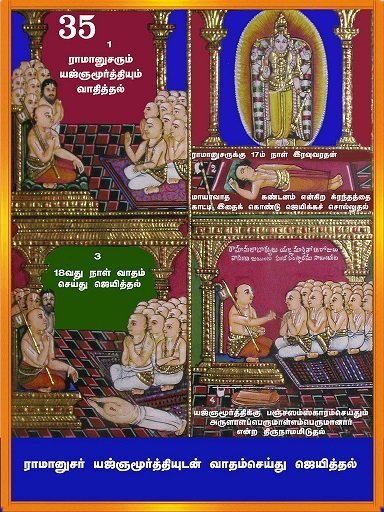
aruLALa perumAL emperumAnAr also accepts srIvaishNava sanyAsAsramam from
emperumAnAr himself after breaking his EkadhaNdam, accepts a
thridhaNdam, shikai, yagyOpavItham, etc and stays in his own mutt closer
to emperumAnAr’s mutt. He starts learning the srIvaisNava sampradhAyam
principles from emperumAnAr himself.
mutt?”. At that time, a local person replies “which emperumAnAr?”. The
srivaishnavas ask “Are there two emperumAnAr’s in our sampradhAyam?” and
the local person replies “Yes, there is emperumAnAr and there is aruLALa perumAL emperumAnAr”. The srivaishnavas finally say “Oh! we are looking for
udayavar’s mutt” and the person points them to the mutt. aruLALa perumAL emperumAnAr happens to be there at that time and becomes very upset
that since he was living in a separate mutt with the same name as emperumAnAr while this
conversation happened. Immediately he destroys his mutt, comes to
emperumAnAr and tells him that he does not want to live in a separate
place anymore explaining the conversation which happened. emperumAnAr accepts him, instructs him to live along with him in his own mutt and also explains all
confidential principles to aruLALa perumAL emperumAnAr.
Let us now understand his glorious literary contribution for our sath sampradhAyam.
aruLALa perumAL emperumAnAr, out of his divine mercy, writes two
prabhandhams in thamizh, gyAna sAram and pramEya sAram. These two
prabhandhams bring out the most beautiful principles of our sampradhAyam,
especially bringing out the glories AchAryan in a very beautiful way. piLLai lOkAchAryar‘s srIvachana bhUshaNam closely follows the principles that are explained by aruLALa perumAL emperumAnAr in these prabhandhams. mAmunigaL has done beautiful vyAkyAnams for these prabhandhams.
From this we can
understand the power/integrity of our guru paramparai. aruLALa perumAL emperumAnAr who heard the most important principles from emperumAnAr himself directly, lays the foundation for rahasya granthams. These
principles are subsequently documented by piLLai lOkAchAryar in his rahasya granthams. These beautiful principles include
- bhagavath
kalyANa guNams – auspicious qualities of bhagavAn like vAthsalyam –
parental affection, svAmithvam – his ownership over everyone else,
sauseelyam – magnanimity, saulabhyam – easy accessibility, etc
- bhagavath nirhEthuka krupai – bhagavAn‘s causeless mercy
- AchArya vaibhavam – the glories of AchAryan
- the necessity of having total faith on AchAryan
- bhAgavatha vaibhavam – the glories of all bhAgavathas
- the importance of our attitude and servitude towards bhAgavathas
- AchArya/bhAgavatha apachArams (offenses) and its ill effects
Eventually,
mAmunigaL (who is emperumAnAr himself) arrives and writes beautiful
commentaries for the rahasya granthams as well as aruLALa perumAL emperumAnAr‘s gyAna and pramEya sAram prabandhams. A series of articles are written on gyAna sAram based on mAmunigaL’s commentary in srI rAmAnuja dharsanam. Please view the same at https://www.varavaramuni.com/home/sriramanuja-dharsanam-magazine in multiple languages.
Let us now enjoy the thaniyan of gyAna sAram.
மருளாம் வினை கெடும் மார்க்கம் பெற்றேன்
மறைநான்கும்சொன்ன பொருள் ஜ்ஞான ஸாரத்தைப் புந்தியில் தந்தவன்
பொங்கொளிசேர் அருளாளமாமுனி அம்பொற்கழல்கள் அடைந்த பின்னே
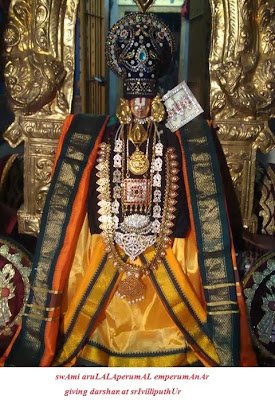
Simple translation: I
was fully immersed in worldly pleasures (of women having beautiful
blackish twirly hair and spear-like eyes) and was suffering in the
endless cycle of samsAram. But my ignorance was destroyed and my
miseries were dispelled after surrendering unto the beautifully glowing
golden feet of aruLALa perumAL emperumAnAr who instilled the essence of
four vEdhas through gyAna sAram firmly into my intelligence.
essence of all sAsthram from emperumAnAr. He was an expert in the areas
of
- thathvam – bhagavAn with chith (sentients) and achith (insentients) as
his sarIram (body)/prakAram (attribute)
- hitham (the means) and
- purushArththam (the goal).
He was totally dependent on emperumAnAr and had
no other refuge and was constantly engaged in service to emperumAnAr‘s
lotus feet. Out of his divine mercy, to uplift all jIvAthmAs by
explaining these divine principles, he explains the essence of thathvam,
hitham and purushArththam in dhrAvida bAshai (thamizh) to facilitate even
the most ignorant person to understand these principles easily. Since
this prabhandham discusses the essence (sAram) of gyAnam (thathvam,
hitham, purushArththam), it was named as gyAna sAram.
Let us have a quick understanding of thathva hitha purushArththam. piLLai lOkAchAryar have explained these principles in a crystal clear
manner in thathva thrayam and artha panchakam.
- thathvam
thathvam
means truth. In spiritual matters, one must first understand the truth.
Our pUrvAchAryas have often discussed the importance of understanding thathva thrayam (tattva trayam – the three truths). In fact, piLLai lOkAchAryar has compiled a beautiful rahasya grantham named thathva
thrayam (https://granthams.koyil.org/thathva-thrayam-english/). In the
first sUthram itself he says “mumukshuvAgiya chEthananukku mOksham
uNdAm pOthu thathva thraya gyAnam uNdAga vENum” (முமுக்ஷுவாகிய
சேதநனுக்கு மோக்ஷம் உண்டாம் போது தத்வ த்ரய ஜ்ஞானம் உண்டாக வேணும்) –
For the one who is desiring for salvation from the cycle of birth and
death, he shall have a clear understanding about the three truths viz
chith (jIvAthmA – sentient beings), achith (insentient beings) and
Isvara (bhagavAn – supreme lord) before being freed from samsAram.mAmunigaL‘s vyAkyAnam for this sUthram is most beautiful and must be
heard from an AchAryan – he is called “visathavAk shikAmaNi” for his
ability to present matters in the most beautiful and comprehensive
manner. One should clearly understand the sarIra-sarIri bhAvam – that
the bhagavAn is the super-soul of all chith (sentient beings) and achith
(insentient beings). Because of this eternal relationship, chith and achith are fully sub-servient to bhagavAn and are present for the
pleasure of bhagavAn only.
- hitham
here means sAdhanam/upAyam (the means or the process). Once the relationship between bhagavAn and jIvAthmA is understood, jIvAthmA should behave according to
that relationship to achieve the ultimate goal (purushArththam – to be
discussed next). Several processes are explained in sAsthram to achieve
the ultimate goal – but 5 amongst those are considered as the most
important. They are:
- karma yOgam –
Performing yAgam (sacrifice), dhAnam (charity), thapas (penance), etc
according to sAsthram is called karma yOgam. Three types of renunciation
are essential for karma yOgam:
-
- karthruthva thyAgam – “I am the doer” should be given up
-
- mamathA thyaAgam – “this is my responsibility” should be given up
-
- pala thyAgam – “I shall enjoy the result” should be given up
- gyAna yOgam –
Fully situated on self and god realised state and being constantly
engaged in meditation of the auspicious qualities of bhagavAn
- bhakthi yOgam
– Advanced/Matured state of gyAna yOgam – just like there is no
spills/breaks when oil flows from one place to another, there should be
continuous meditation of bhagavAn and action for bhagavAn
- prapathi –
accepting bhagavAn himself as the means to achieve the ultimate goal
after understanding that karma, gyAna, bhakthi yOgams are not fit for
our svarUpam since they involve ones own efforts which highlights jIvAthmA‘s svAthanthriyam (independence). But since jIvAthmA‘s true nature is to be utterly dependent on bhagavAn, prapathi is the natural means to reach emperumAn.
- AchArya
abhimAnam – Becoming the object of bhagavAn‘s grace through the grace of
an AchAryan and simply being fully dependent on such great bhAgavatha’s
grace. AchArya is a true representative of srI mahAlakshmi in this
world. Just like srI mahAlakshmi recommends to bhagavAn to accept the jIvAthmAs inspite of their defects, AchAryas also do the same. Out of
their causeless mercy towards the suffering jIvAthmAs, they bless the jIvAthmAs and facilitate their upliftment by bhagavAn.
Of all the upAyams, our pUrvAchAryas have shown that, AchArya abhimAnam is the best and easiest path for us to follow.
- purushArththam
purushArththam means that which is desired by a purusha (jIvAthmA in this context). Five types of goals are explained.
-
- dharma – any virtuous activity done per the orders of sAsthram
-
- artha – accumulating material wealth according to ones own varNAsrama dharma
-
- kAma – material enjoyment both in this world (bhUmi) and the other world (svargam, etc)
-
- kaivalya
mOksham – self-realisation and enjoying ones own soul – this is
generally identified as a cheap goal. Considering the glories of bhagavAn and the nature of jIvAthmA as a servitor to bhagavAn, if one
desires to enjoy himself, it is compared to a person eating his own
flesh while there is most delicious food available in front of him.
- kaivalya
-
- bhagavath kainkarya mOksham – Serving bhagavAn eternally in paramapadham (the spiritual world).
Having
fully realized one’s true nature that he is a servitor of bhagavAn, it
is most apt for the jIvAthmA to engage in blemishless service in
paramapadham which is the land of unlimited bliss.
To summarize, a jIvAthmA should understand his true relationship with bhagavAn, accept
bhagavAn only as upAyam through the mercy of an AchAryan and (aim to)
serve bhagavAn eternally in paramapadham.
Thus we have seen a little glimpse of aruLALa perumAL emperumAnAr‘s charithram (life) and vaibhavam (glories). He fully demonstrated total dependence towards emperumAnAr. We have also observed the important principles revealed in gyAna sAram. Let us bow down at his feet and pray that we too get such AchArya nishtai.aruLALa perumAL emperumAnAr thirumEni (vigraham) is currently seen in vinjimUr (his avathAra sthalam), thiruppAdagam, srIvilliputhUr, etc.
Let us also enjoy some pictures from this year’s celebrations at thiruppAdagam dhivya dhEsam. Full set of pictures at https://plus.google.com/photos/107723698299182214927/albums/5947432025686636337.
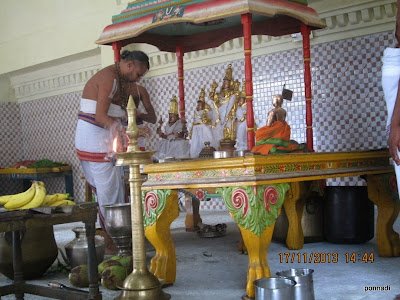
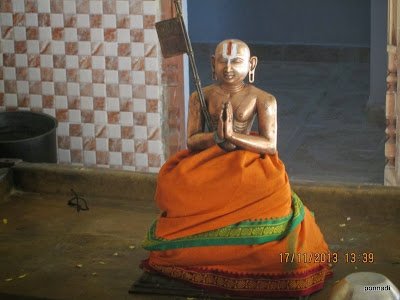
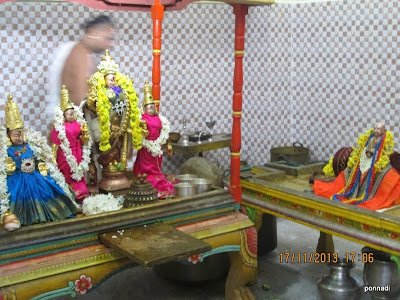

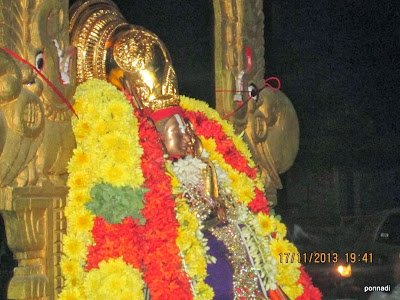
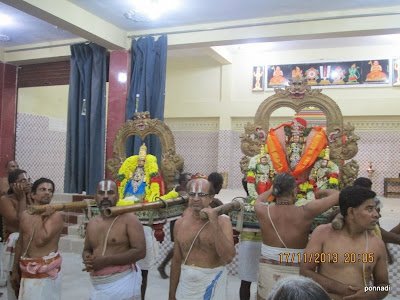


archived in https://granthams.koyil.org, also visit https://granthams.koyil.org, https://acharyas.koyil.org, https://sriperumbuthur.blogspot.com
Clearly shown the way.